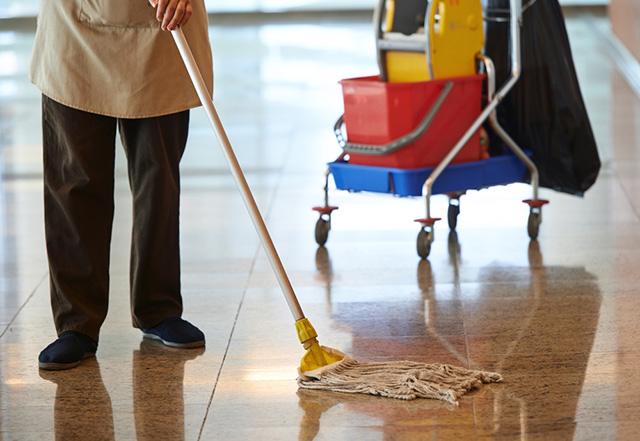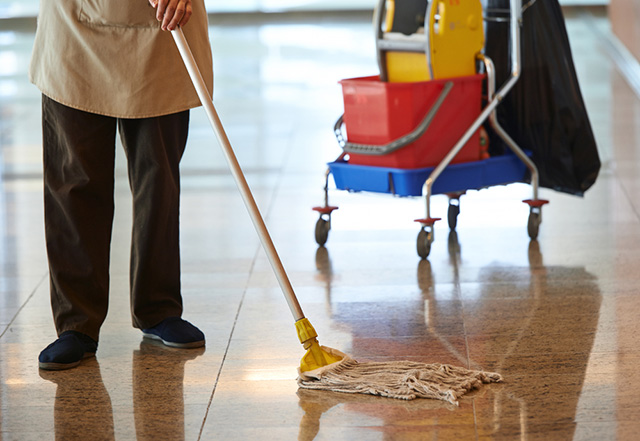
Honest, paywall-free news is rare. Please support our boldly independent journalism with a donation of any size.
 Seventy percent of domestic workers in the country are paid less than $13 per hour, and 48 percent are paid an hourly wage that is less than the level needed to adequately support a family. Workers face rampant physical and sexual harassment and abuse. (Photo: Domestic Worker via Shutterstock)
Seventy percent of domestic workers in the country are paid less than $13 per hour, and 48 percent are paid an hourly wage that is less than the level needed to adequately support a family. Workers face rampant physical and sexual harassment and abuse. (Photo: Domestic Worker via Shutterstock)
Fifty cents an hour. That’s how much Lizet Palencia was being paid in 1994 when she began her first job as a live-in domestic worker in New York City.
“I had to do everything for them,” Palencia said. “I remember it was 1 in the morning, 2 in the morning, I was still washing dishes.”
“I was just focusing on getting the money because I needed it,” she said.
More than two decades later, domestic workers in New York City are still not granted their full rights – not only in wages, but also in terms of health insurance, the right to one day off per week, and in some cases, even the right to work without physical and sexual harassment in the workplace.
In 2010, New York became the first state in the nation to enact a Domestic Workers’ Bill of Rights. The law was passed after years of lobbying, with domestic workers across the state sending handwritten letters to legislators in Albany. Although domestic workers won basic rights through the law, the right to bargain collectively was not one of them, and enforcement of the Bill of Rights has been almost impossible. But some domestic workers in New York think this has allowed them to focus on worker-led, grassroots organization tactics.
The Domestic Workers’ Bill of Rights Today
The Domestic Workers’ Bill of Rights expands overtime pay for live-in workers; includes rights to a day of rest each week and three days of paid vacation per year; and provides protections from sexual harassment. However, many compromises were made in its passage. The final version of the law did not mandate health insurance or notice of termination, part of the campaign’s original demands.
And one of the main problems organizers say followed the passage of the Bill of Rights was its enforcement. Although workers’ rights groups like New York-based Domestic Workers United (DWU) attempted to partner with the Department of Labor to form an enforcement strategy that would track abuses in the home, wage theft and labor violations, the plan was never enacted. Sixty domestic workers formed the Domestic Workers Legal Clinic to resolve claims against employers, but that, too, has not had active cases.
“It’s not really enforced as it should be, because there are women that are still being exploited,” said DWU’s Christine Lewis.
Tamara Brown, a professor at Brooklyn College and author of Raising Brooklyn: Nannies, Childcare, and Caribbeans Creating Community, saw much of the same issues in her own research.
“While there are lawyers who have worked with domestic workers in order to regain lost wages, and fighting employers on their behalf for maltreatment, the government itself does not have an evaluative process to see if the Bill of Rights is actually being enacted, and supported in the way that it needs to be,” Brown told Truthout.
This has left many organizers questioning the effectiveness of policy-focused movements for workers’ rights. Instead, they are organizing workers through a grassroots approach that aims to educate workers to demand their rights and to show them new techniques for communicating with their employers – including worker consciousness trainings and monthly meetings, poetry workshops and even public theater.
Last fall, domestic workers from across New York City packed into the second floor office of Haitian Women for Haitian Refugees at DWU’s monthly meeting. Workers began the meeting by introducing themselves and compared experiences on the job throughout the meeting.
“It all starts with education and empowerment. We have to believe that our value is profound,” Lewis said.
Palencia, who has been attending DWU meetings and events for years, got involved with DWU after her previous employer called police on an undocumented Mexican woman working in the same townhouse. The employer told the police the woman had stolen $20 from her purse.
“The police arrested her without any proof,” Palencia said.
And her former employer fired Palencia shortly afterward, when she refused to testify in court that she also saw the Mexican woman stealing.
Palencia values the relationships she has fostered with other workers in DWU and across New York.
“I love the way we respect each other. We meet a lot of people from different countries with different stories,” she said.
“Being in DWU, especially with the members that have been involved a long time, I see them as members of my family,” she said.
Beyond Unionization
Domestic workers were excluded from Franklin D. Roosevelt’s 1933 New Deal social benefits, including minimum wage, unemployment compensation, Social Security and the right of collective bargaining. While some of these other benefits were won throughout the 20th century, domestic workers still do not have the right to unionize and are not protected by occupational safety or health laws.
Some domestic worker advocates are attempting to amend New York’s labor laws directly – particularly the New York State Employment Relations Act – in order to include domestic workers and grant them the right to bargain collectively. In November 2010, the New York State Department of Labor developed a report that discusses the feasibility of allowing domestic workers to bargain collectively in the state. Although the report says that is it possible to amend the state’s Employment Relations Act to allow domestic workers to unionize, it also discusses the obstacles that must be overcome for this to happen.
But even if domestic workers were granted the right to unionize as a strategy to call for their rights, the framework for collective bargaining in the National Labor Relations Act was based on long-term employment at large firms – a structure with which domestic workers in the US are unfamiliar, as they operate with a single employer-employee ratio.
The inability to organize in traditional collective bargaining settings such as unions and the lack of state enforcement of the Domestic Workers’ Bill of Rights have fostered spaces for alternate modes of organizing and the formation of democratic, worker-led movements. But for many workers, fear is still a major obstacle in demanding their rights.
“It’s low-wage labor, and they need the work and there’s this great fear that they will lose employment if they organize,” Brown told Truthout. “Deportation is a concern as well, and this idea that basically they don’t have power.”
In domestic workers’ organizations like the majority Filipina group Damayan, where 99 percent of its membership consists of undocumented domestic workers, worker consciousness becomes all the more important.
“Recently we just wrapped up the workers’ academy – a four-part workshop series where we give them ‘know your worker’s rights’ trainings,” said Riya Ortiz, a community organizer with Damayan.
“It’s more about raising the collective consciousness of the workers, and it works,” Ortiz said.
Damayan recently held an occupational safety and health training, where workers learned how to handle chemicals and hazardous materials within the home, and “how to assert yourself with your employer that you shouldn’t be using this bleach and then inhaling it,” Ortiz said. While it is important for the workers to learn to assert themselves as individuals, domestic workers and organizers also believe it is crucial to create class and worker consciousness.
One of the main obstacles to policy change for domestic workers is the lack of statistics on the number of workers and the conditions they work in. The latest study from Domestic Workers United is from 2006, and estimates that there are 200,000 women working as housekeepers, caregivers or nannies in New York City alone.
A 2012 report from the National Domestic Workers Alliance documents the experience of 2,000 domestic workers in 14 US cities. The report found that 70 percent of domestic workers in the country are paid less than $13 per hour, and 48 percent are paid an hourly wage that is less than the level needed to adequately support a family.
According to the report, interviews with domestic workers also found widespread verbal, physical and sexual abuse, with 91 percent of domestic workers not complaining after encountering problems with their working conditions for fear of losing their job. These kinds of numbers make grassroots-led worker trainings all the more important.
“During the workers’ academy, the workers were fired up, and that’s our goal – to really train an army of domestic workers who know what their rights are, and who can identify if their rights are exploited,” Ortiz said.
“They don’t need lawyers, they don’t need us to tell them that. They know something is wrong and then you give them the language. And then when they’re ready to fight, we fight with them,” she said.
Matching Opportunity Extended: Please support Truthout today!
Our end-of-year fundraiser is over, but our donation matching opportunity has been extended! All donations to Truthout will be matched dollar for dollar for a limited time.
Your one-time gift today will be matched immediately. Your monthly donation will be matched for the whole first year, doubling your impact.
This matching gift comes at a critical time. As Trump attempts to silence dissenting voices and oppositional nonprofits, reader support is our best defense against the right-wing agenda.
Help Truthout confront Trump’s fascism in 2026, and have your donation matched now!